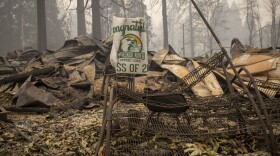ARI SHAPIRO, HOST:
Some rural school districts in Oregon are starting online learning this week after it was postponed twice by the worst wildfires on record. But as Elizabeth Gabriel with member station KLCC reports, the school district's road to recovery is only just beginning.
ELIZABETH GABRIEL, BYLINE: The small, rural community of Blue River is one of the hardest hit by one of the biggest wildfires in Oregon this summer. About a thousand people live in the town a couple hours east of Eugene. The fast-moving Holiday Farm Fire destroyed more than 400 homes in the area. But the start of online classes means students are finally gaining some normalcy.
COREY CHRISTENSEN: Hi, Brice.
BRICE: Hi.
CHRISTENSEN: It's so good to see you. Look at that hair (laughter). It's the same length as mine (laughter).
GABRIEL: That's high school government teacher Corey Christensen remotely welcoming her senior class.
UNIDENTIFIED STUDENT: Wow, it's been a minute.
CHRISTENSEN: It's been a minute. I mean, it has been six or seven months, so (laughter)...
GABRIEL: Despite the laughs, the community has been through a lot over the past few weeks. There's about 220 students in the school district, and roughly three-quarters were displaced by the wildfires or live in evacuation zones. A majority of the district's staff members were also evacuated, and about half of them lost their homes. Superintendent Lane Tompkins says, at least for now, teachers may focus primarily on the emotional well-being of their students.
LANE TOMPKINS: They're going to be showing up and supporting our students and families as they start working through this. And that'll be their focus these next few days. Content might take a backseat for a while, and that's OK. We just need to make sure our kiddos are doing well, and we will reach out and help them as best they can.
GABRIEL: But that may be difficult for some students who have been unable to return home. McKenzie school board member Alyssa Brownlee says students who have been able to return have not received mail, let alone Internet access or cellphone service, due to burned or disconnected phone lines.
ALYSSA BROWNLEE: You know, you've got people who don't have homes now and who are living in motels in Eugene and getting ready to be displaced from those, you know, with no place else to go. And the prospect of coming home means, you know, living in a place where there is no infrastructure for communication. There are going to be ongoing road closures. So, you know, I think for a lot of people, school is sort of the lowest priority right now.
GABRIEL: Brownlee says her house wasn't caught in the fire, but the fire means there's no Internet at her house. So even though she would rather have her daughter at home for her last year of high school, that may not be possible. For now, Brownlee's daughter will spend the first week of the school year with family friends about an hour and a half away in Bend. But since it might be months before the area has Internet access, her daughter may temporarily move to Chicago to live with her aunt.
BROWNLEE: It's heartbreaking to have to make that decision, you know, but I have to think about what's best for her. And, you know, I also - at the same time, I feel like, you know, I'm really lucky I have the resources to send her and pay for her to live with somebody else. I have that option, and, you know, a lot of people up here don't.
GABRIEL: And the lack of connectivity is just one of many challenges for the district. If parents are unable to rebuild their homes and businesses, that can mean a loss of enrollment and school funding. And if teachers and staff members are unable to find housing in the area, that can make it harder for the district to retain staff.
For NPR News, I'm Elizabeth Gabriel in Eugene, Ore. Transcript provided by NPR, Copyright NPR.
NPR transcripts are created on a rush deadline by an NPR contractor. This text may not be in its final form and may be updated or revised in the future. Accuracy and availability may vary. The authoritative record of NPR’s programming is the audio record.


